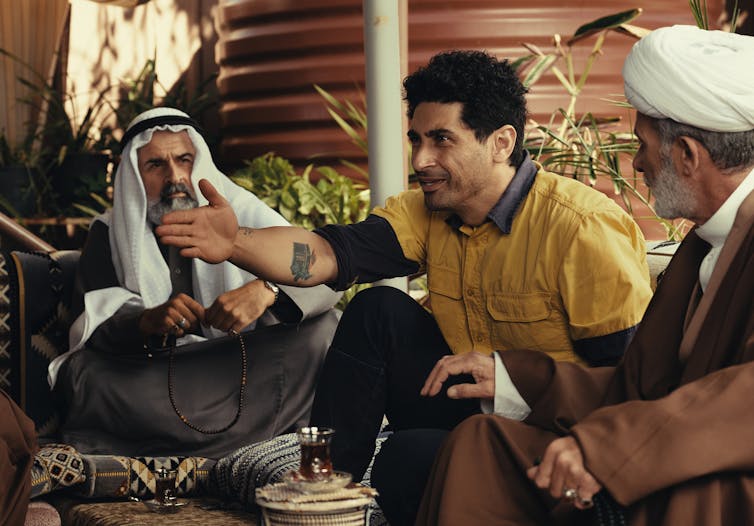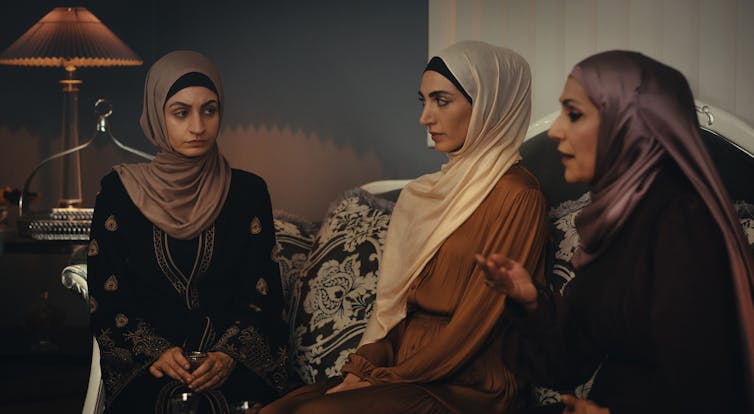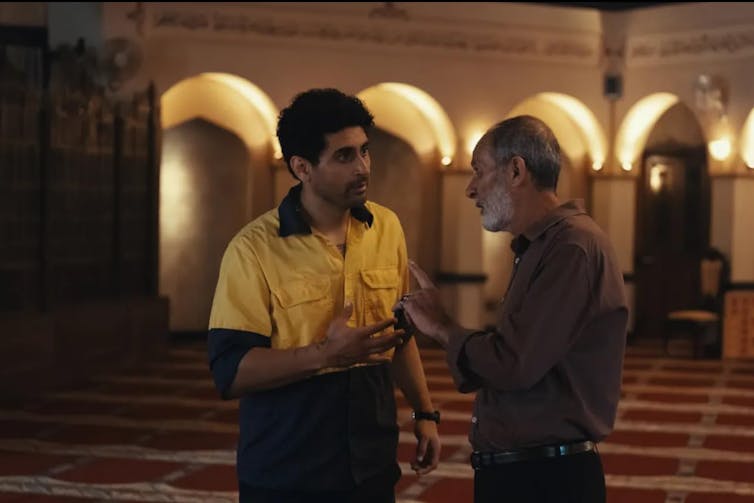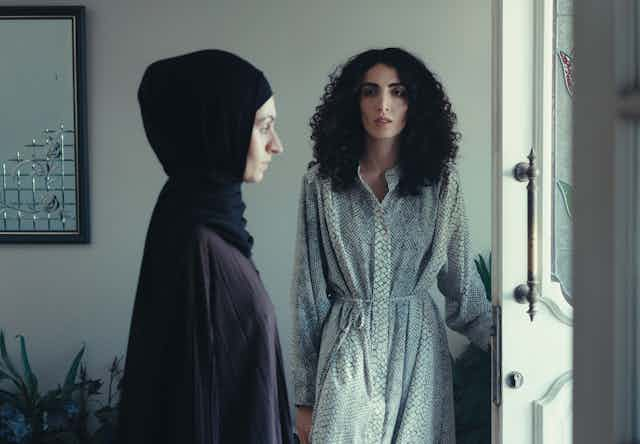House of Gods is a gripping new Australian TV drama. It reveals the inner workings of an imam’s family and community, and the corrupting effects of power, ambition and secrets on family and faith.
Set in Western Sydney, the saga commences on election day at The Messenger mosque. Sheikh Mohammad (Kamel El Basha) is a progressive, charismatic contender for the esteemed position of head cleric. But he is embroiled in controversy when a young woman unexpectedly plants a kiss on his cheek while posing with him for a selfie.
The seemingly harmless gesture swiftly snowballs into a scandal dividing the community and sparking a clash of ideologies within the mosque’s tight-knit community.
Although Sheikh Mohammad eventually emerges victorious over his conservative adversary Sheikh Shaaker (Simon Elrahi), the triumph is tainted by a startling revelation. Sheikh Mohammad’s adopted son, Isa (Osamah Sami, also co-creator and writer), has struck a clandestine deal with a corrupt official to secure his father’s win in exchange for hefty monthly payments.
The cleric’s efforts to bridge the gap between multiple generations and connect Islam with modern life in Australia is at the heart of the story. But unaware of his son’s dealings, an intricate web of lies, bribes and familial rivalry soon emerges, set against the backdrop of mosque politics.
Read more: Black comedy, political drama and a documentary about a cult: what we're streaming this February
The realism of lived experience
Sami’s performance as Isa is spot-on, thanks to his firsthand understanding of growing up as the son of a progressive Shi'ite cleric. His personal background brings depth and authenticity to the character, making his portrayal truly compelling.
Fadia Abboud’s direction is enriched by her deep understanding of the Arabic community, lending genuine realism to every scene. Take, for instance, the conversation between Sheikh Mohammad and the local football coach, where the historic tensions between Sunni and Shi’ite faiths are delicately portrayed. Both characters navigate their differences with respect and caution, reflecting the nuanced dynamics within their community.
The inclusion of Arab, Middle Eastern and Muslim actors adds an authentic touch to the drama. Their performances capture the cultural and social subtleties reminiscent of my own Arabic family and community. Through expressive body language, lively facial expressions, and intense physical affection, the actors animate the passionate social dynamics often characteristic of Middle-Eastern societies.

Sky Davies’ cinematography captures both private and public moments with striking compositional intention. The beautiful garden scenes where Sheikh Mohammad converses with his eldest daughter, Batul (Maia Abbas), under a luminescent grape vine, reference the central role dappled light plays in the intricate designs of mosques.
Integrity shines through the costume and set design and in the meticulous portrayal of Muslim dress and architecture. These elements reflect a profound understanding of how faith influences the transition between private and public life, adding credibility to the storytelling.
Mighty heroines
Sami was joined by co-creator and associate producer, Shahin Shafaei, along with Blake Ayshford and Sarah Bassiuoni. Shafaei and Bassiuoni come from Iranian and Egyptian families. Their collective experience provides valuable insights into the female experience, enriching the depiction of Muslim women beyond Western stereotypes of female oppression.
The struggles encountered by characters such as Batul, her younger sister Hind (Safia Arain), and her mysterious best friend Jamila (Priscilla Doueihy) echo real-life challenges. For instance, the scenes at the swimming pool vividly illustrate the women’s desires and rebellions, as well as their activism and resilience in advocating for women-only hours at the public pool.
Batul and Hind are mighty. Their rivalry hinges on their personal freedoms and to what extent they conform to community expectations. This ensures that they negotiate power and agency within their own cultural context – refreshingly removed from Western standards.

Sheikh Mohammad champions his daughters’ freedom, sparking discussions on gender equality and underscoring his progressive views on women’s roles in the Islamic community. A notable instance is when he appoints his daughter, Batul, as vice president of the mosque, defying traditional expectations and causing shock in the community.
Written by Arabs, featuring Arabs
The lead performances are outstanding. El Basha is a Palestinian screen and stage actor, theatre director, playwright and producer. He gained critical acclaim in 2017 when he won the Volpi Cup for Best Actor at the 74th Venice International Film Festival. In House of Gods, the actor again shows he is adept at capturing a proud and principled man who values his dignity and honour.

House of Gods is more than just an Australian television series. It’s a bold and unflinching exploration of contemporary life that is thought-provoking, authentic and complex. With its intricate plot twists and nuanced characters, it has the capacity to showcase the depth and diversity of Australian storytelling worldwide.
Abboud remarks that House of Gods:
stood out as original and risky. Importantly, it wasn’t an ‘us’ and ‘them’ story. The dilemma didn’t come from our relationship to the West and racism. It was a powerful drama, with no big-name Anglo actor, which always seemed to be needed in shows with non-English speaking communities.
For many in the Australian Arabic community, including Abboud, seeing a project created and written by Arabs featuring Arabs as lead characters is an exciting and welcome development.
House of Gods is on ABC and iView from February 25.
Read more: Shayda: this unflinching portrayal of domestic violence marks a profound shift in Australian cinema

